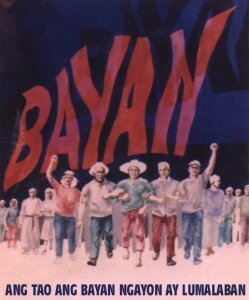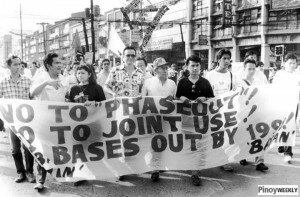 The umbrella group Bagong Alyansang Makabayan today called on the public to remain vigilant over proposals to amend the Constitution, especially now that the process has been likened to just passing any law.
The umbrella group Bagong Alyansang Makabayan today called on the public to remain vigilant over proposals to amend the Constitution, especially now that the process has been likened to just passing any law.

Posted on 30 September 2011 by admin
 The umbrella group Bagong Alyansang Makabayan today called on the public to remain vigilant over proposals to amend the Constitution, especially now that the process has been likened to just passing any law.
The umbrella group Bagong Alyansang Makabayan today called on the public to remain vigilant over proposals to amend the Constitution, especially now that the process has been likened to just passing any law.
Comments (0)

Posted on 29 September 2011 by admin
Press statement
September 29, 2011
With the public reeling from the devastation wrought by typhoon Pedring, multisectoral group Bagong Alyansang Makabayan (BAYAN) today said that President Benigno S. Aquino III should be sensitive enough not to worsen the people’s misery and stop the scheduled imposition of the 12% value-added tax (VAT) on toll on October 1.
The group issued the statement as it joined various people’s organizations in protesting the impending imposition of the regressive tax on the fees being charged in the country’s major toll roads, including the North Luzon Expressway (NLEX) and the South Luzon Expressway (SLEX).
“A large part of Luzon is reeling from the devastating effects of typhoon Pedring. Another typhoon has also entered the Philippines. The VAT on toll on October 1 will only add to the misery of the people. The Aquino government has the power not to push through with the October 1 implementation of the VAT on toll,” said Bayan secretary general Renato M. Reyes, Jr.
BAYAN noted that the damage to crops and infrastructure caused by Pedring has been initially pegged at almost P1 billion, affecting more than 35,300 families in Luzon. Some 33,890 tons of rice from 56,421 hectares (has.) in five regions were destroyed while damaged corn crops totaled 241 tons from 1,711 has. in two regions. Most of the affected areas are in Cagayan Valley, Central Luzon, Calabarzon, and Bicol – regions that directly rely on the NLEX and SLEX to facilitate economic activities.
BAYAN said that Pedring gave an additional compelling reason for the Aquino administration to rethink the VAT on toll, which is expected to further exacerbate the ever increasing cost of living in the country.
“Even relief operations to the provinces will be affected by the VAT on toll fees,” Reyes said.
BAYAN also reiterated that imposing the VAT on toll is counterproductive in the long run as it undermines domestic economic production. It pointed out that toll roads are a key infrastructure that helps facilitate the efficient movement of goods and people, including workers.
Toll rates have already significantly increased early this year, with SLEX fees jumping by as much as 270 percent.
“Malacanang does not need the VAT on toll fees. There is no compelling reason to rush the implementation of this proposal. Government in fact already is projected to have windfall revenues arising from the VAT on oil to the tune of P70 billion this year. Yet its appetite for revenues squeezed from the people seems insatiable. VAT has become the most convenient form of raising revenues because it is not as difficult as other important revenue measures such as plugging tax leaks” Reyes said.
The group said that Malacañang should not use the Supreme Court (SC) decision upholding the legitimacy of the VAT on toll in justifying the imposition of the regressive tax. In the name of public interest, Aquino can opt not to collect it if he wants to and no law will be violated. #
Comments (0)
Posted on 28 September 2011 by admin
———————————————————————————————————————————-

33 Photos

Typhoon-hit community Dona Pepeng in San Mateo, Rizal says thanks to all those who helped them

15 Photos

54 Photos
Comments (0)

Posted on 26 September 2011 by admin
9 Photos
Comments (0)

Posted on 26 September 2011 by admin
Comments (0)

Posted on 22 September 2011 by admin
News Release
September 22, 2011
The umbrella group Bagong Alyansang Makabayan described as “outrageous and insidious” a Palace spokesman’s statement that there are no political prisoners in the Philippines today.
Yesterday at a press conference, Presidential Spokesman Edwin Lacierda declared that there were no political prisoners under the Aquino regime and that extrajudicial killings were being investigated. “I think we need a better definition of terms and maybe clearer terms of reference with respect to human rights,” Lacierda also said.
“It’s outrageous to say that there are no political prisoners in the country when there are in fact 360 of them now, many of them jailed under the term of Gloria Macapagal Arroyo. The denial of their existence is insidious because it means the government has really no intention of addressing their plight,” said Bayan secretary general Renato M. Reyes, Jr.
“These Palace officials should get off their high horse. Just because they can’t define something doesn’t mean it doesn’t exist. Political prisoners are real and are languishing in jails. These include the sickly, elderly, women, students, artists, farmers and workers. These include NDFP consultants in the peace process. We’d gladly give Lacierda, or any other official for that matter, a tour of different jail facilities here if they’re still not convinced,” Reyes said.
Bayan said that the Aquino government is merely continuing the policy of the past governments to deny the political nature of the offenses that political prisoners are charged with. The group said that it has been legally and politically convenient to simply charge activists with common crimes to take away the political context of their detention.
“I just got back from Calbayog yesterday after visiting our UP colleague Ericson Acosta who has been detained for more than 7 months now. Acosta was arrested under the Aquino regime last February 13. He was taken in by the AFP because they saw him carrying a laptop while in a far-flung barrio. That was enough to get him arrested. They later planted a grenade on Acosta to justify the filing of charges of illegal possession of explosives,” Reyes said.
“I can assure Mr. Lacierda that Acosta is very real. His plight is very real. To say that the abuses of the past are no longer happening is either the result of sheer ignorance or a penchant for denial. Persons are still being arrested and false charges are still being filed against them, as in the case of Acosta,” Reyes said.
Acosta’s plight
Acosta was arrested in San Jorge, Samar last February 13. He was accused of being a ranking member of the New People’s Army. At the time of his arrest, Acosta was carrying a laptop and was unarmed. The provincial prosecutor has recommended charges be filed against Acosta. His case however is now being reviewed by the Department of Justice.
To mark the anniversary of Martial Law, Acosta and Reyes recorded “Prison Sessions” which features original songs and covers recorded inside the Calbayog jail facility. Acosta and Reyes first played together at the fourth floor of UP’s Vinzons Hall in 1994, during their student activist days. Both were members of the student cultural group Alay Sining and wrote several of the songs still being performed by Alay Sining today.
Listen to Prison Sessions 1 and 2 at these links.
– recorded Sept 20, 2011
Comments (1)

Posted on 20 September 2011 by admin
13 Photos
Comments (0)

Posted on 20 September 2011 by admin
Comments (0)

Posted on 17 September 2011 by admin
News Release
September 18,, 2011
 The umbrella group Bagong Alyansang Makabayan today called on the public to make their voices heard on the issue of oil deregulation and the imposition of the Value Added Tax on oil products and toll fees. The group will be joining nationwide mass protests tomorrow to send a message to Malacanang that it has not done anything substantial to address the public’s economic woes.
The umbrella group Bagong Alyansang Makabayan today called on the public to make their voices heard on the issue of oil deregulation and the imposition of the Value Added Tax on oil products and toll fees. The group will be joining nationwide mass protests tomorrow to send a message to Malacanang that it has not done anything substantial to address the public’s economic woes.
“The protests on Monday only underscore the absence of any substantial and meaningful response by the administration to the people’s economic demands. We are being bludgeoned by weekly oil price increases, by the VAT on oil, and soon, by the VAT on toll fees. This triple whammy is just too much,” said Bayan secretary general Renato M. Reyes, Jr.
While protests are expected be peaceful, various groups are hoping to send a strong message to the Aquino administration.
“Malacanang cannot blame the people for choosing to go to the streets. The problems are getting worse and the government offers non-solutions. Instead of finding fault in the protesters, government should focus on immediate and medium-term solutions to the oil problem. Pantawid-pasada just won’t cut it anymore,” Reyes said.
People’s review of deregulation
Bayan is also readying a “people’s review” of more than a decade of the oil deregulation law, which it plans to submit to the Executive and to Congress. President Aquino has asked several government agencies to conduct a review of the oil deregulation law after a dialogue with transport leaders last week.
“The people’s review will go beyond just making the oil deregulation law work. The people’s review aims to highlight the inherent flaws of deregulation as a policy. We will back up our analysis with hard facts. The results of the review will be submitted to Malacanang and to the Senate and House energy committees,” Reyes said.
“If Aquino is serious in reviewing the deregulation law, he should be open to inputs not just from his economic team but also from consumer groups and other affected sectors,” he added.
In the past, Bayan together with Ibon Foundation, scientist group AGHAM and consumer group POWER conducted a “people’s review” of a decade of the Electric Power Industry Reform Act (EPIRA) and submitted to the results to the House Committee on Energy.
Immediate call to scrap VAT on oil and toll
Bayan also reiterated its call to scrap the VAT on oil and toll to spare consumers further economic burdens. The VAT on toll takes effect October 1 this year.
According to the Congressional Policy and Budget Research Department, VAT on oil revenues are expected to reach P70 billion this year, or a windfall of P26 billion, because of constantly increasing oil prices. This is significantly bigger than last year’s VAT on oil collection of P45 billion.
“Instead of asking the public to tighten their belts, government should instead tighten its own by reducing VAT collections on oil and toll fess. The public has long been trying to make ends meet and making sacrifices. We have not seen the government make any sacrifice,” Reyes.
“Government is obsessed with collecting the P70 billion in VAT on oil revenues at the expense of the people. It’s just obscene to be earning windfall revenues of P26 billion while the public suffers from high oil prices. Our policymakers are either callous or oblivious towards the people’s plight,” he added. ###
Comments (0)

Posted on 17 September 2011 by admin
by
Roland G. Simbulan
University of the Philippines
Grande Island, Subic, Sept. 12 – It is drizzling Monday afternoon, the ocean water in Subic Bay is choppy all around Grande Island which on the google map seems to guard the entrance of Subic Bay from South China Sea. At least 25 ships, mostly commercial and container vessels float on the waters inside the Bay. A large tanker, with the markings NYK Hinode, floats near the Hanjin Heavy Industries Shipyards. More than 20 years ago when Subic was still the United States’ largest naval base outside U.S. territory, such a scene was unthinkable. For Subic, and Subic Bay for that matter, was an exclusive enclave for the U.S. Navy and the U.S. 7th Fleet that operated in the Western Pacific. Commercial and civilian vessels were then not allowed inside Subic Bay.
Unthinkable before, because the very spot where I am standing at Grande Island used to be off limits to Filipinos. Grande Island back then was exclusively for the “Rest and Recreation” of U.S. military servicemen. Now, Grande Island is a Filipino resort with classy hotels seen clearly from the shorelines of the communities around the bay. From Grande Island, one can see huge orange and white cranes and floating drydocks of the Subic Bay Metropolitan Authority (SBMA) ready to service visiting ships to unload their cargo and container vans or to repair commercial vessels from all countries of the world.
September 16, 2011 this year, marks the 20th anniversary of the historic rejection of the bases treaty, or to be accurate, the non-concurrence by the Philippine Senate of the proposed treaty that was to extend the U.S. bases for another 10 years after the expiration of the 1947 RP-U.S. Military Bases Agreement. That was a historical feat because it marked the shutting down and dismantling of the largest U.S. overseas military naval and air force bases that were located on Philippine soil since 1901. And the U.S. was still back then, unquestionably the strongest economic and military superpower in the world. Filipino nationalists consider that day as historically significant because it marked the end of 470 years of foreign military base and troops’ presence on Philippine soil, which began during Spanish colonization and extended almost permanently during the American colonial period and beyond Philippine independence in 1946. It was a proud moment for the Philippines that many people in Japan, South Korea and in many places where there are still foreign military bases and foreign troops, want to learn from and replicate.
This is why Filipino nationalists and the nationalist movement in general have long considered foreign bases presence as antithetical to independence. They were the most visible physical symbols of continuing colonialism and farce independence: Immediately after our 1946 independence and under the 1947 US-RP Military Bases Agreement, an estimated 250,000 hectares of arable lands with rich agricultural and mineral potential in 23 bases in 13 provinces —prime real estate– were placed under the exclusive and absolute control of the U.S. government. The original agreement was for the rent-free use of our territory, for 99 years, later to be shortened in negotiations to expire in 1991. It was as if these lands were carved out and seceded from our sovereign control, making a travesty of our independence.
Arguments during the debates on the future of the U.S. bases in the Philippines inside and outside the Senate more than 20 years ago focused on the economic and security issues.
Economic Issues
When the U.S. military bases and facilities were pulled out from the Philippines 20 years ago, some people predicted economic ruin for the country and security fears for the nation. I even remember the threat of then U.S. Ambassador Nicolas Platt when he said at the height of the bases debates that ” foreign investments would dry up and the economy would collapse if the U.S. bases pulled out.” Instead, the former U.S. base lands today have become linchpins of economic growth in the country. This is the “peace dividend” that has lured businesses to set up shop in the former bases, including the South Korean Hanjin Heavy Industries, which has made the former U.S. military facilities one of the fastest-growing employers in their respective regions. Today, the former U.S. military bases in the country are reported to employ almost more than four times the number of Filipino workers that the U.S. Navy and U.S. Air Force employed at their Vietnam War peak, and has brought in more than P17-19 billion in revenues into the national treasury.
The Gordon family who were once the most die hard defenders of the U.S.bases when they dominated politics in Olongapo (and still do) are now the first to admit that “the Philippines has one of the best experiences in bases conversion if not one of the most successful base conversion of a foreign military base”, as former Olongapo Mayor and former SBMA administrator Richard Gordon would state in a 1996 interview with a national daily. In fact, the former U.S. bases have become symbols of economic resurgence for the country such that, during the Presidency of Fidel V. Ramos, Subic was chosen as the site to host the Asia Pacific Economic Council(APEC) meeting of heads of state.
Security Issues
As for the security issues, the Philippine dismantling of the U.S. military bases in the Western Pacific was actually our contribution to the ending of the Cold War in our part of the world. For the U.S. bases were in fact the most visible vestiges of the Cold War in the Asia Pacific, used by the Pentagon for its aggressive gunboat diplomacy in the Korean peninsula, as launching pads for military intervention during the Vietnam War and as springboards for intervention against countries like Iran and other countries in the Middle East.
The “peace dividend” that accompanied this decision was that after we removed the bases here, we could now secure better relations with ALL our neighbors and not be held hostage by being host to a superpower that dragged us into its military interventions and possibly, made us a magnet for attacks as during World War II, when the U.S. bases here were the first targets by the Japanese Imperial Army. But the country without the U.S. bases must also be able to develop its external defense capability both in terms of modernizing its national defense forces and multilateral diplomatic initiatives to defend national interests and sovereignty. This is to deserve its truly sovereign status like our smaller neighbors like Singapore, Brunei, Vietnam and Burma, especially in dealing with claimants to the Spratlys such as China. It must also learn to deal on its own with its internal armed conflicts and peace and order threats such as the Abu Sayaff, without relying on the almost-permanently-based covert operatives of the U.S. Special Operations Forces which we have invited here under the cover of the Visiting Forces Agreement.
And what was the role of the Mt. Pinatubo factor in the outcome of the issue of the bases? Believe it or not as if it was a god sent act, Mt. Pinatubo volcano erupted on June 12, 1991, the very day of Independence of the Philippines in the revolution against Spain. In reality, the Pinatubo factor made it more difficult for the anti-bases senators to argue against the immediate bases termination. It reduced the number of anti-bases Senators from 19 to 12 Senators because of the perceived hardships and dislocations in Central Luzon brought about by Pinatubo, though 12 was still a safe number to reject the proposed new bases treaty.
Pentagon’s desperation to keep forward bases
The Pentagon, despite their temporary withdrawal of Clark Air Bases within three hours just before the Mt. Pinatubo eruption (they had claimed during the bases negotiations that it would take them at least 10 years to withdraw any large base), still wanted to keep their remaining forward-deployed bases in the country very badly. Beyond 1991, they wanted desperately to keep 14,698 hectares: Clark Air Base, Subic Naval Base, John Hay Base in Baguio City, O’Donnel Transmitter Station in Tarlac, Wallace Air Station in Poro Point, La Union, the San Miguel Communications Station, and the Capas Naval Transmitter Station. But no amount of political pressure on the 12 Senators, now referred to as the “Magnificent 12″ could change their minds. For prior to this decision, the Senate had passed seven resolutions against U.S. bases and nuclear weapons with 19 Senators consistently signing these. Here, we must give credit to then presidentiables Senators Aquilino Pimentel and especially Senate President Jovito Salonga who sacrificed their presidential plans by taking a historic stand that clearly defied U.S. strategic interests in the Asia-Pacific region. For Salonga’s Liberal Party, it was really a good chance to clear the party’s name of the stigma of being initially a pro-U.S. party, for it was the LP-dominated government of then Pres. Manuel Roxas that signed the U.S.-RP Military Bases Agreement in 1947.
Leadership Role of Senate
The Senate clearly took a leadership role in directing us towards a sovereign Philippine foreign policy in accordance to our 1987 Constitution when it made its Sept. 16 decision to close down the bases. This decision even defied mainstream public opinion 20 years ago, which generally favored the retention of the U.S. bases.The Senate decided that it was the right decision to make and in accordance with the spirit of the Constitution, and that the people would eventually realize that it was the right thing to do. Guiding the Senate’s vote to dismantle the bases were state policies such as “the State shall pursue an independent foreign policy…in its relations with other states, the paramount consideration shall be national sovereignty, territorial integrity, national interest, and the right to self-determination”. There was also the new constitutional policy that the Philippines, “consistent with the national interest, adopts and pursues a policy of freedom from nuclear weapons in its territory.” The latter Charter provision was consistent with at the seven UN-initiated treaties that the country had signed against ” the deployment of nuclear weapons and foreign military forces” in other regions of the world including those nuclear weapons and bases “deployed in outer space, the moon and other planets.”
Overall, public opinion today as expressed in leading opinion surveys is such that the Senate decision was the right but difficult decision. Except in the honky tonk community of barangay Barreto along the Olongapo national highway, which is frequented by American and Australian expats. This is where some bars with teasing names like “Wet Spot Bar”, “Corkscrew”, “Lips (Upper and Lower)”, etc. still welcome visiting U.S. troops on brief goodwill visits or during Balikatan exercises under the terms of the VFA . Critics claim that the latter is a camouflage seeking to restore U.S. military presence in a new form. Many bars and nightclubs in Barreto are said to be owned by Australians and Americans who have long retired from the U.S. armed forces after being assigned to the Philippines. Barrio Barreto residents say that only last July, a visiting U.S. naval vessel docked at Subic and its crew of U.S. servicemen went to the bars to be entertained but with an early evening curfew. A nightclub in Barreto even still has a big streamer in front that says, U.S. TROOPS WELCOME! At the Perimeter Road at Balibago, Angeles along the side of former Clark Air Base, the same mood still exists where aging foreign expats, now living in the country, can be seen walking in their slippers as if nothing had changed. But it has changed.
R.M. Magsaysay Avenue, once referred to by writers as “the Avenue of Broken Dreams”, which fronts the main gate of the former Subic Naval Base, now looks much different from the time when the whole avenue was saturated with seedy “ago go” bars, massage parlors and “rest and recreation” restaurants waiting to satisfy the sex-hundry U.S. Navy men leaving the base for their brief leave furlough. Now, the Olongapo City Mall stands tall right outside the former base gate, teeming with locals and students who patronize the fast food and appliance centers, as well as the vendors selling cheap China products and pirated DVDs. The American Legion office and its pub in Magsaysay Avenue, now barely has any visitors, according to a cigarette vendor nearby that this author talked to.
While the level of military prostitution enhanced by the former U.S. bases’ presence has been diminished, prostitution and violation of children’s rights has not really been eradicated since the national economy to which the bases economy has been integrated, continues to be characterized by the unequal distribution of wealth where more than 65% of Filipinos live below poverty line. With the signing of the 1999 VFA and the Mutual Logistics Support Agreement in 2001, units of U.S. military personnel are back to exploit and take advantage of the poverty of Filipina women and children. Which gives us the lesson that political independence has to be sustained and consolidated by economic sovereignty.
Farmers and indigenous peoples are still disallowed from their claims for inclusion of the former base lands in agrarian reform, and in the ancestral domain as in the case of the Aeta people. The former bases have been blatantly excluded from the government’s agrarian reform program, allowing only the rich local and foreign investors to pour in money to develop the fertile baselands. Landless Filipino farmers continue to be denied the use of the former baselands for agriculture, thus preventing the bases’ transformation from “weapons” use into “ploughshares.”
I always like to tell my visiting Japanese and South Korean academic and activist friends who visit to learn about our bases conversion experience that in the Philippine experience, bases conversion, while initially open to local participation in the bases communities, later was tailored to the elite-based decision-making prevailing in the national economy. Thus, I say, there is the continuing clash between the people’s base conversion strategy and the elite-dominated national economic strategy and system. Their potential for growth as commercial business enclaves today however, show potential under a neoliberal economic regime that continues to grow. Military buildings and ammunition storage had been transformed into factories, commercial offices, recreational and sports facilities, schools including a branch of the University of the Philippines, Ateneo and other schools at both Clark and Subic. There are zoos such as the Zoobic Safari, civilian airports, aviaries, and so many hotels and restaurants. In short, I tell our Japanese and Korean foreign friends who are so awed by our feat of kicking out the bases that our lesson here is that, THERE IS LIFE AFTER THE U.S. BASES. But the continuing challenge is how to make it a pro-Filipino and pro-poor economic conversion and development.
Today, what used to be the command headquarters building of the Subic Base commander, is now used as the corporate offices of the SBMA, an authority that was created by law to spearhead the conversion of the former U.S. naval base into the commercial free port and special economic zone that it is today. One of the largest Philippine flags that I have seen flies proudly over the flagpole in front of the SBMA corporate building. And just below the flagpole are the commemorative palm prints and names of the “MAGNIFICENT 12 SENATORS” who made Sept. 16 possible. But it was the Filipino people, in their long struggle and sacrifices with so many freedom fighters and martyrs, who made the Sept. 16 rebirth possible and the Senate action was really a reaffirmation of that aspiration that is now articulated in the 1987 Constitution.
 As I walk barefoot and leave footprints on the sand along the beautiful coastlines of the Grande Island beach resort at Subic, I wonder what it was like then when only Filipino waiters and servants could enter these exclusive places to serve American military personnel and their families. I am just glad that that very gross travesty of Philippine independence had been ended 20 years ago.
As I walk barefoot and leave footprints on the sand along the beautiful coastlines of the Grande Island beach resort at Subic, I wonder what it was like then when only Filipino waiters and servants could enter these exclusive places to serve American military personnel and their families. I am just glad that that very gross travesty of Philippine independence had been ended 20 years ago.
Comments (1)